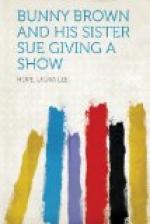“Oh, Peter wouldn’t need any practice,” said George. “He’d be just fine in the barnyard scene. I brought him with me!”
“Well, I’m sorry, for I’m afraid I’ll have to disappoint your friend Peter,” said Mr. Treadwell. “But where is he?”
“Here in this basket,” answered George, and he held up a small one in front of the stage manager.
CHAPTER XXI
“WHERE IS BUNNY?”
Mr. Treadwell looked first at George, then at the basket, and once more at George.
“Now look here, George,” said the actor. “I don’t mind your making fun or having jokes, but I’m very busy now, for the first act of the rehearsal is going to start. Besides, you shouldn’t bring your baby brother to the hall in a small basket like that.”
“My baby brother?” cried George with a laugh. “I haven’t any baby brother! I have a sister Mary, but——”
“But you said Peter was in there,” said Mr. Treadwell. “And if Peter is——”
“Oh, Peter isn’t a baby, and he isn’t my brother,” said George with another laugh. “He’s only a——”
But before he could say what Peter was a loud crow sounded from inside the basket which George held up.
“Cock-a-doodle-doo!” sounded all through the hall, and Bunny, Sue, and the others who were getting ready for their parts in the dress rehearsal of the play, laughed. Mr. Treadwell looked surprised.
“Why—why—it’s a rooster!” he exclaimed.
“Yes, Peter is my pet bantam rooster,” said George. “I brought him with me because I thought he could crow in the barnyard scene, and make it more natural like.”
“Well, a crowing rooster would be a good performer to have in a barnyard scene on a stage,” agreed Mr. Treadwell. “But the only thing about it is that we couldn’t be sure that he would crow at the right time. He might crow when Lucile was singing, or when Bunny Brown was doing some of his tricks, or when Sue was making believe run away from me when I’m dressed up like a tramp.”
“Yes,” said George, “that’s so. Peter crows a lot, and you can’t tell when he’s going to do it. But, Mr. Treadwell, he always crows when he flaps his wings, and if somebody could hold his wings so they couldn’t flap then he couldn’t crow. I wish we could have him in the play!”
“Well, we might try him, anyhow,” said Mr. Treadwell, with a laugh. “Though I haven’t anybody I could let stand near and hold the rooster’s wings so he wouldn’t crow.”
“I could do that,” offered George. “My rooster likes me.”
“Yes, I suppose he does,” agreed the stage manager. “But you have to recite a piece in the play, George, and your rooster might start to crow when you were reciting.”
“That would make me laugh,” said George, with a smile, “and I couldn’t pucker up my mouth to whistle, and I have to do that in my piece.”
“Then I guess we had better not have the rooster in the play,” said Mr. Treadwell. “But since you have brought him we’ll let him stay for the practice, and we’ll see how he behaves. He certainly would be good in the barnyard scene, and make it quite natural, but I’m afraid he’ll crow at the wrong time.”




